Yes the term may be “mental health,” but in reality many of the emotional hurdles people face can also lead to serious physical symptoms. Anxiety, in particular, shows itself in a variety of ways, evolving into painful struggles that can have a real impact on the human body. The website Bustle recently touched upon this, highlighting a series of symptoms that are tied to chronic agitation.
Though you may not realize it, stomach problems tend to be associated with anxiety. Research has shown a clear link between this mental health struggle and the human gut. Symptoms can include everything from indigestion, to searing belly aches, to the need to physically vomit. Resility Health clinical director Kirsten Fescoe spoke to Bustle about this particular ailment, emphasizing its commonality.
“Each time we experience stress and don’t manage it, it builds in our body,” she explained. “Many people living with high levels of stress and anxiety experience stomach issues of all sorts. Both mental health professionals, as well as physicians, can help you deal with these unpleasant symptoms.”
Back pain is another major symptom of anxiety. This also can be related to tension and perhaps the way you physically carry yourself when you are under a lot of stress. Muscle tension falls under the category as well, whether it be because of clenched fists or even jitters during a tense moment.
Another physical manifestation is headaches. This could be a lingering pain or a sharp, shooting migraine after a stressful encounter. A common stereotype you see is people rubbing their temples during a period of anxiousness, but there is some truth behind that. Additionally, the head pains often lead to a lack of concentration. As Fescoe mentioned in the article, difficulty focusing is a common side effect (which, in turn, can create even more stress).
The last major callout has to do with a general lack of sleep. We all know the physical toll a night of tossing and turning can lead to. And one of anxiety’s biggest side effects is, in fact, insomnia. Often times, the time we are lying in bed is the time we set aside to ruminate and potentially focus on anxious habits. Not addressing this (and averaging less than your fair share of rest hours each night) can have long term health effects on major internal organs.
Our advice is to always check in with a mental health professional before any of these “minor” aches and pains turn into something much more serious.


